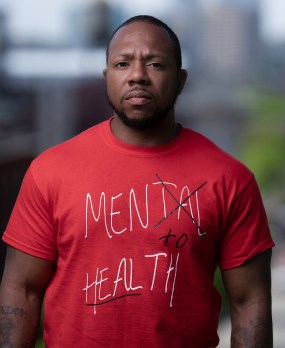By Quelina J.

James Harris
The barbershop is a staple in the black community. Beyond providing fresh haircuts and sharp lineups, the barbershop is sort of a mantuary. A place where men go to relax, relate, and release. It is a hub for them to congregate, connect with other men, tell jokes, vent, debate, and share advice. They discuss everything from relationships and sports to community happenings and politics. The older gentlemen serve bits of wisdom, while the younger guys receive the informal mentoring they are often in need of from a male figure. The barbershop is therapy for black men.
Although barbers provide safe spaces for men to express themselves, they are not mental health professionals. Black men need [real] therapy too. According to Black Health Matters, only 26 percent of men of color between the ages of 18 to 44 who experienced anxiety or depression used mental health treatment. This is especially alarming when suicide is the third leading cause of death for black men between the ages of 15 to 24. Why aren’t more black men seeking help?
James Harris, counselor, and author of MAN, Just Express Yourself created Men to Heal, an initiative that encourages men to focus on their overall well-being, with an emphasis on their mental health. Growing up as a foster child, now a veteran and a black man in America, Harris has firsthand knowledge of the importance of having access to mental health resources. In addition to ego and the lack of provider availability, Harris believes black men are reluctant to seek therapy due to mental health professionals not having culture competence. He shared what it was like for him being a young, black kid and a ward of the state  going to mandatory therapy. “He was an older white guy who told me to sit on the couch and tell him everything. I felt judged. It was unrelatable. He had on his bowtie. I was a young stubborn kid from the projects. I wasn’t comfortable telling him anything.”
going to mandatory therapy. “He was an older white guy who told me to sit on the couch and tell him everything. I felt judged. It was unrelatable. He had on his bowtie. I was a young stubborn kid from the projects. I wasn’t comfortable telling him anything.”
Harris also discussed his second experience with therapy after returning from a tour in Afghanistan. “I knew I was different and needed assistance. My therapist was an older white lady with no military or combat experience. That’s part of culture as well. She was significantly older than the average veteran and didn’t have any relatable experience. A lot of veterans don’t get help because of those reasons. They find the groups more beneficial because it’s a shared relatable experience. My fellow veterans understand my triggers.” Harris says that relatability and shared experience are key components to reaching black men and fostering an environment where they feel safe enough to be vulnerable.
There are countless misconceptions regarding mental health and many of them stem from society using mental illness and mental health interchangeably. However, they are not the same. So, what is the difference? According to the American Psychiatric Association, “mental illnesses are health conditions involving changes  in emotion, thinking or behavior (or a combination of these).” The U.S. Department of Health and Human Services defines mental health as “our emotional, psychological, and social well-being. It affects how we think, feel, and act. It also helps determine how we handle stress, relate to others, and make choices.” Your mental health may suffer due to dissatisfaction with job or a challenging relationship, but that does not mean you have a mental illness. To gain a better understanding of where you are, seek the assistance of a mental health professional.
in emotion, thinking or behavior (or a combination of these).” The U.S. Department of Health and Human Services defines mental health as “our emotional, psychological, and social well-being. It affects how we think, feel, and act. It also helps determine how we handle stress, relate to others, and make choices.” Your mental health may suffer due to dissatisfaction with job or a challenging relationship, but that does not mean you have a mental illness. To gain a better understanding of where you are, seek the assistance of a mental health professional.
Harris created The HEALing Hub, a facility that offers outpatient therapy and other alternative and holistic health services like yoga, Zumba and mindfulness. His goal is to make The HEALing Hub a one-stop shop for wellness. It is a place where men [and women] can go to improve their mental, physical, and emotional health. A safe space for people to have honest discussions, gain self-awareness and improve the overall quality of their lives. As a community, let us encourage more black men to seek therapy. Let us make it ok for them to heal and perhaps they will prioritize their mental health just as much as their haircuts. Maybe The HEALing Hub can become the new barbershop.

2 comments
This is an important article. Mental illness has always been a stigma in the black community. This is a well written article that touches on many important issues. Kudos to Ms Quelina J.
This article is very informative. Mental health has long been a stigma in the black community. I hope that this article can help change the lives of black men who need the help it speaks of, even if it’s a few. Kudos to the author, Ms. Quelina J, for addressing this important issue.
Comments are closed.